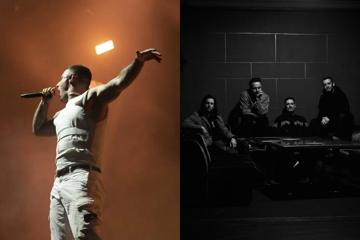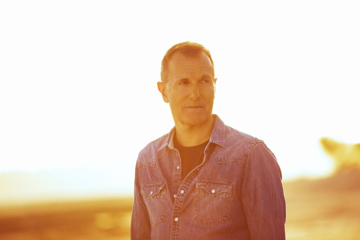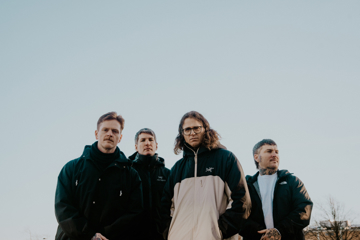Still Hungry
After enlisting a star-studded cast for his previous solo record, Slash focused on working with one singer on new disc Apocalyptic Love. Brendan Crabb gets in the bunker with rock’s legendary axeman.

A few days after making a guest appearance during Alter Bridge's set at the Sydney leg of the Soundwave Festival, Slash is finalising the Apocalyptic Love mixes, as well as beginning a day of promotion for the new album. While fielding questions about the status of supergroup Velvet Revolver, he quickly remarks that they've been on hiatus for some time and little more. When quizzed about Guns N' Roses' then upcoming induction into the Rock And Roll Hall of Fame, he's initially amicable, then jovial on the topic. When pried too much for his liking about whether he's spoken to fellow former Gunners members about it though, it's a polite, but firm case of, “I don't want to talk about that anymore” and a quick change of subject.
However, the top hat-donning guitarist is infinitely more enthusiastic whilst discussing Apocalyptic Love. He grins when it's suggested that it sounds more like a fully-fledged band effort than its predecessor. His 2010 self-titled album featured numerous guest vocalists (Ozzy Osbourne, Fergie, Lemmy and Chris Cornell among them) and appearances from several former Guns N' Roses members. Apocalyptic Love's vocals and lyrics are solely handled by Alter Bridge's Myles Kennedy, who also appeared on Slash. Did he feel the band vibe was something vital missing from Slash?
“No, just as a rock'n'roll kinda thing, the unity of an actual group is something that I pretty much strive for,” he explains. “But when I was doing the first record, which sounds great to me, it wasn't put together that way because of the amount of people involved and just the way that it worked out. But the guys that I worked with, we still played together sort of in a band environment when I was doing that record. But this has got a little bit more of a synergy with the other guys. We've been playing together on the road for the last year-and-a-half and the songs were performed live in the studio, as opposed to pieced together, the way that a lot of people do records these days.”
There is obvious songwriting chemistry between Slash and Kennedy – something the former says he felt immediately.
Don't miss a beat with our FREE daily newsletter
“That's happened right from the very first rehearsal and then the ensuing shows. I started thinking this would be a good band to do a record with. It seems like everybody knew who Myles was but me,” he says when asked about his history with the vocalist/guitarist. “Matt Sorum [ex-Guns N' Roses, Velvet Revolver] had reached out to him a couple of times over a long period with Velvet Revolver, but I didn't know who he was until roughly around 2009. I reached out to him, because I knew of his reputation and I needed somebody to sing a couple of songs on the record. I'd finished the rest of it; I had two songs left over and I couldn't think who should sing these two songs. I think a lot of it had to do with the fact that Zeppelin had called him in to replace Robert Plant at one point. So I thought, 'This guy's gotta be good!” he laughs. “I flew him into LA and we met for the session for a song called Starlight that was on my record. And that's where we started.”
It's remarked that it must be easier to write with just one singer in mind.
“Yeah, well, that's the way I've been doing it for years,” he laughs. “I just did one record where I used a lot of different vocalists, which was a lot of fun, but it wasn't a career move, it was just a project that I did.” It's asked whether he envisions attempting the multiple vocalists' schtick again. “No, that was just sort of a one-off. I might do something like that down the line at some point, but right now I'm just concentrating on this record, this tour and I would think that it would probably be if I was going to do another record after this tour was over I would do it with the same guys (known as Myles Kennedy & The Conspirators). That kind of chemistry just doesn't happen all the time… You can't take it for granted when it happens. We all work really well together and there's a sort of spark there.”
Touring is what Slash seems most enthused about; he lights up at the mere suggestion of returning to the road – a return to our shores is tentatively planned for late September/October [UPDATE: Those dates have now been announced here - Ed]. While other acts have to focus more on the touring side to make a living due to free-falling record sales, the veteran guitar-slinger is in the enviable position of being able to largely work according to his schedule.
“Because I'm sort of my own record company and I'm more or less in control of my own destiny, really the only criteria for songwriting is just write something that's good. It's not necessarily focused on singles. But you know, there are people I work with that go, 'Well, this would probably make a good single,' and I'm like, 'Okay, whatever',” he laughs.
The era of artists selling millions of copies of debut albums a la Guns' 1987 classic Appetite For Destruction is largely no more. What does he think of where the industry is headed?
“It is what it is,” the guitarist ponders. “There are certain aspects of it that I think are more or less progressive and sort of a natural par for course. And there are some aspects of it that I don't agree with. But I don't preach about it very much, I just figure out my own route to follow, and sort of navigate the terrain. It's definitely a different time. I talk to a handful of young artists over time, here and there about it. Because they ask me,'What's the best way to do it?' The model that I used when I first started is non-existent, pretty much, now. So now it's sort of like the Wild West, you've gotta just go out and make it up. There's no tried-and-true method anymore… There's a lot of great resources. But there's no guarantee that any of them will work, you know?” he laughs. “So you just have to sort of pick your own path and try and make the best of it.
“There's not a lot of artist development, like what I was familiar with, throughout the whole industry. It's very few and far between, but there are people in the industry who really care about music for music's sake, and are there to try and help. But you know, the business at large, it's hard to really trust that, wait for that to happen,” he laughs. “But fortunately there are some people out there that really care about developing a band and going out and looking to see who's around or what talent is out there. So it's not non-existent, it's just limited compared to how it was when I was first coming up.”







